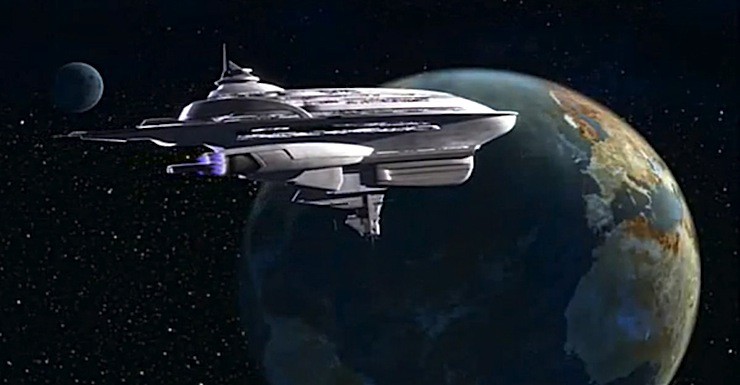Science fiction loves a space colony, or alternatively a colony ship on its way to one. My new book Children of Time focuses on one such craft, humanity’s last hope in a desperate, millennia-long journey to reach what the crew very much hope will turn out to be a terraformed and habitable world. The ship itself is slowly coming apart at the seams, the crew have only an uneasy alliance with each other, and worst of all, their brave new world turns out to be already tenanted. Their cargo—surviving humanity—is in suspension, as are they for most of the trip—so however desperate their situation, they dodge the bullets some of the colonists and starfarers have to deal with in the following five(ish) novels about generation ships…
Non-Stop by Brian Aldiss
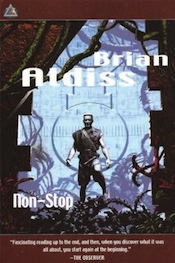 One of the oldest and best-known generation ship stories, Aldiss’s ship follows the primitive Complain whose enclosed world is populated by tribes of various levels of technological sophistication. His epic quest leads him to the understanding that they are all aboard a spaceship on its return journey to earth. However, he also discovers that the journey was supposed to take six generations, while more than twenty have already passed, meaning that the ship is surely off course, on an endless journey into the empty dark of space. Worse, rumours abound of giants and other things that have somehow got into the ship from outside…
One of the oldest and best-known generation ship stories, Aldiss’s ship follows the primitive Complain whose enclosed world is populated by tribes of various levels of technological sophistication. His epic quest leads him to the understanding that they are all aboard a spaceship on its return journey to earth. However, he also discovers that the journey was supposed to take six generations, while more than twenty have already passed, meaning that the ship is surely off course, on an endless journey into the empty dark of space. Worse, rumours abound of giants and other things that have somehow got into the ship from outside…
Dark Eden by Chris Beckett
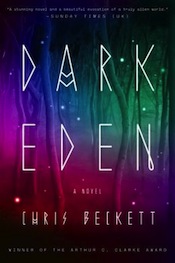 One of my all-time favourite SF books. Eden also follows a post-tech primitive society, but in this case one trapped on a sunless and terrifying planet, descended from a single pair of crash survivors (with all that entails, including massive incidence of inherited conditions and flaws). The tribe has legends derived from the accounts of the original survivors to their children, and lives in a static, cargo-cult state waiting for a rescue from Earth that will never come.
One of my all-time favourite SF books. Eden also follows a post-tech primitive society, but in this case one trapped on a sunless and terrifying planet, descended from a single pair of crash survivors (with all that entails, including massive incidence of inherited conditions and flaws). The tribe has legends derived from the accounts of the original survivors to their children, and lives in a static, cargo-cult state waiting for a rescue from Earth that will never come.
The Forever Watch by David Ramirez
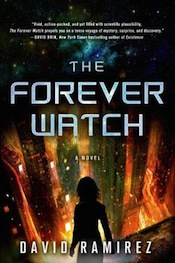 In contrast to the previous two, the crew of the colony ship Noah know exactly where they’re going and what they’re doing. They live in a totalitarian society where Mission trumps everything and asking questions above your pay grade is strongly discouraged. An investigation into what seems to be a particularly grisly and impossible murder leads to realisations that there are terrible secrets on board, and that everything about the relatively comfortable life of the crew might be based on a lie. But if the lie is big enough, and the truth is terrible enough, do you really want to find out…
In contrast to the previous two, the crew of the colony ship Noah know exactly where they’re going and what they’re doing. They live in a totalitarian society where Mission trumps everything and asking questions above your pay grade is strongly discouraged. An investigation into what seems to be a particularly grisly and impossible murder leads to realisations that there are terrible secrets on board, and that everything about the relatively comfortable life of the crew might be based on a lie. But if the lie is big enough, and the truth is terrible enough, do you really want to find out…
Doctor Who and the Face of Evil—episode by Chris Boucher, novel by Terrance Dicks
 A shout out to a great favourite from the Tom Baker era—not least for the introduction of Leela as a companion—this was my first encounter with the idea of a post-tech society fallen into primitive ways. Because of Evil Computer issues (and the Doctor), we meet two warring tribes, the Tesh and the Sevateem, who are descended from the original technicians and survey team of an expedition. I remember being enthralled with the Target novelization, very taken with the idea of spacemen turned into, practically, cavemen, and the way the Sevateem described the Tesh as having “two skins” because of the protective suits they wore.
A shout out to a great favourite from the Tom Baker era—not least for the introduction of Leela as a companion—this was my first encounter with the idea of a post-tech society fallen into primitive ways. Because of Evil Computer issues (and the Doctor), we meet two warring tribes, the Tesh and the Sevateem, who are descended from the original technicians and survey team of an expedition. I remember being enthralled with the Target novelization, very taken with the idea of spacemen turned into, practically, cavemen, and the way the Sevateem described the Tesh as having “two skins” because of the protective suits they wore.
The Glorious Angels by Justina Robson
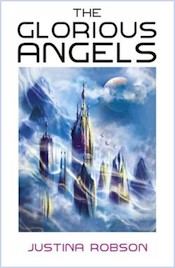 The deep history of the Angels world is complex and occluded, discovered piecemeal as the book goes on. Certainly there seems to be a human culture descended from some manner of colony ship, but how human are they, and where do the shapeshifting, plant-human Karoo come in? Unlike the tribal primitives of some of the stories above, the humans of Angels have a fantastically complex society and technology, but none of it works quite as you’d expect, and most of those who dwell in their huge, mobile cities have no understanding of where it came from and how it all runs. An artefact found in the hostile jungles of the Karoo promises revelation, possibly more than either human or Karoo are ready for.
The deep history of the Angels world is complex and occluded, discovered piecemeal as the book goes on. Certainly there seems to be a human culture descended from some manner of colony ship, but how human are they, and where do the shapeshifting, plant-human Karoo come in? Unlike the tribal primitives of some of the stories above, the humans of Angels have a fantastically complex society and technology, but none of it works quite as you’d expect, and most of those who dwell in their huge, mobile cities have no understanding of where it came from and how it all runs. An artefact found in the hostile jungles of the Karoo promises revelation, possibly more than either human or Karoo are ready for.
The Book of the Long Sun and The Book of the Short Sun by Gene Wolfe
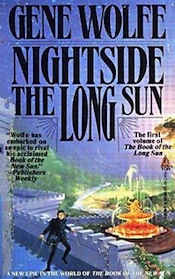 Compared to the Book of the New Sun these gems (7 books in all) are not well known, but they are my favourite exploration of the generation ship and cultures that develop aboard it. Silk is a poor priest living in one of a number of classical-style city states on the inside of a cylinder lit by the “long sun” that runs down its axis. The setting Wolfe gives us is enormously detailed, and Silk’s preoccupations are very prosaic—funding his church and school, battling local criminal figures and political upheavals. The book brings us to Silk’s level and point of view, so that the big revelations—that Silk’s gods are downloaded personalities within the ship’s mainframe—are powerful because we feel the effect they have on him. And then of course, in Short Sun the inhabitants of the ship had actually arrived at their destination and had to evacuate the failing ship, coping with a bizarre alien ecosystem, elusive natives and the divisions and human flaws they have brought with them…
Compared to the Book of the New Sun these gems (7 books in all) are not well known, but they are my favourite exploration of the generation ship and cultures that develop aboard it. Silk is a poor priest living in one of a number of classical-style city states on the inside of a cylinder lit by the “long sun” that runs down its axis. The setting Wolfe gives us is enormously detailed, and Silk’s preoccupations are very prosaic—funding his church and school, battling local criminal figures and political upheavals. The book brings us to Silk’s level and point of view, so that the big revelations—that Silk’s gods are downloaded personalities within the ship’s mainframe—are powerful because we feel the effect they have on him. And then of course, in Short Sun the inhabitants of the ship had actually arrived at their destination and had to evacuate the failing ship, coping with a bizarre alien ecosystem, elusive natives and the divisions and human flaws they have brought with them…
Adrian Tchaikovsky is the pseudonym of Adrian Czajkowski, a British fantasy author. His best known work is the ongoing Shadows of the Apt series. His latest novel, Children of Time, is available now from Tor Books UK.










